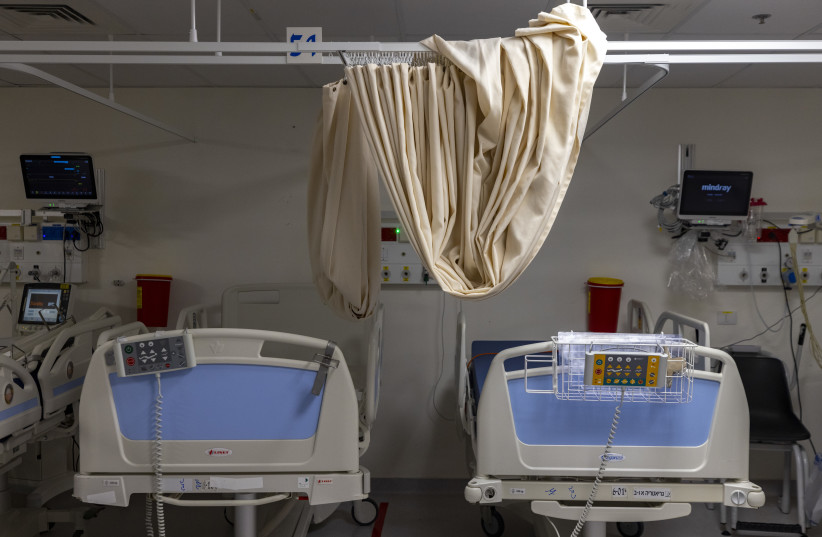October 7 confronted the Israeli rehabilitation system in a state of depletion – coping with severe shortages of personnel, beds, and infrastructure. Out of 8,731 medical residents in Israel in 2021, only 97 chose to specialize in rehabilitation. Other related health professions including physical therapy, occupational therapy, speech therapy and nursing are also coping with acute shortages.
Today, hospitals encounter serious challenges in recruiting top-notch professionals for these essential roles. This difficulty arises, in part, from intense competition with highly sought-after professions, such as plastic surgery, dermatology, and ophthalmology.
Today, the number of hospital beds in Israel is significantly lower than the OECD average. In 2021, Israel had only 0.3 rehabilitation beds per 1000 people as compared to 2 in Germany, 0.5 in the Czech Republic and 1.4 in Hungary.
Rehabilitation and geriatrics, both of which are considered “professions in distress,” are among the most in-demand specialties today. In light of the ongoing rise in life expectancy, the need for geriatric and rehabilitation professionals will only continue to grow. In 2030, the number of older adults living in Israel is expected to reach 1.5 million – about 13% of the country’s population. By 2065, 17% of the country’s citizens will be older adults. Even today, a third of those hospitalized in rehabilitation departments are over the age of 65.
In recent years, efforts have been made to address this work force crisis, which resulted in an increase in the number of practitioners in physical therapy, occupational therapy, speech therapy, and nursing. However, despite these initiatives, the shortages remain unresolved. The growing population and its increasing healthcare needs will likely further worsen these shortages and negatively impact the field of rehabilitation.

Rehabilitation medicine provides patients with tools required to regain as much function for daily living as possible and enjoy an optimal quality of life. In other words: acute medicine adds years to life, while rehabilitation adds life to years.
Rehabilitation requires multidisciplinary medical teams including rehabilitation physicians, nurses, and therapists from a variety of health professions including physical therapy, occupational therapy, speech therapy, nutrition, social workers, and rehabilitation psychologists. The goal is to address the entirety of the person’s needs and find a way to improve his/her motor skills, cognitive abilities, and psychological state.
Failure to undergo rehabilitation in a timely and professional manner can lead to severe consequences. After receiving life-saving treatment, rehabilitation can be what prevents patients from needing lifelong nursing care, whereas the loss of independence can result in decreased self-worth, depression, and withdrawal from society. Rehabilitation is a crossroads that has a significant effect on the patient’s quality of life and long-term emotional well-being.
At present, Reuth Tel Aviv Rehabilitation Hospital has 125 inpatient beds for general rehabilitation, which accounts for 15% of Israel’s total rehabilitation beds. Between its main hospital in Tel Aviv and a clinic in Ramat Gan, Reuth provides 155 slots for day rehabilitation – about one-third of the country’s total.
Thus far, the hospital admitted several patients wounded in the war, mainly suffering from orthopedic injuries. These are people whose lives have changed beyond recognition. In addition to those injured in terror attacks or on the battlefield, we are witnessing an increase in the number of referrals for treatment of people whose underlying conditions have worsened due to the war – conditions such as chronic pain, eating disorders, sexual dysfunction and more. As such, multidisciplinary rehabilitation is critical to facilitating the return to functional independence of both the war wounded and the general population.
The mental and physical rehabilitation crisis
The war created significant challenges for the State of Israel in the provision of mental and physical rehabilitation. It is still too early to know the full scale of this challenge.
The Health Ministry recognizes the gravity of the situation and recently published a series of measures to respond to these urgent needs. These measures include budgetary increases and the addition of hundreds of beds for rehabilitation and psychiatric hospitals, as well as thousands of beds in general hospitals.
These are important steps in the right direction. Alongside them, the state must direct resources to the training of mental health therapists within the public system and elevate professional standards. It is also critical to create attractive training programs to encourage the next generation of promising doctors to specialize in geriatrics and rehabilitation.
The writer is director of Reuth Tel Aviv Rehabilitation Hospital.
